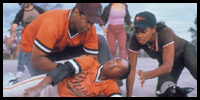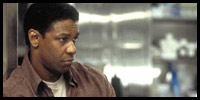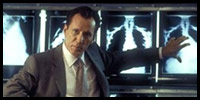
 |
John Q (2002) Directed by Nick Cassavetes Cast: Denzel Washington, Kimberly Elise, James Woods, Robert Duvall, Anne Heche, Eddie Griffin, Ray Liotta, Daniel E. Smith, Shawn Hatosy, Ethan Suplee, Kevin Connolly, Paul Johansson, Larissa Laskin, Laura Elena Harring, Heather Wahlquist, Dina Spybey. 2002 – 118 minutes Rated: Reviewed by Dustin Putman, February 15, 2002.  A hate letter to today's twisted health care system, "John Q" is a sometimes-thoughtful, sometimes-preachy rumination on the timely subject that gets its effectiveness from yet another powerhouse performance by Denzel Washington (2001's "Training Day"). For all of the missteps that this highly-charged drama makes, there are just as many moments that director Nick Cassavetes (1997's "She's So Lovely") and screenwriter James Kearns hit the mark on, making spacious room for audience discussion afterward.
A hate letter to today's twisted health care system, "John Q" is a sometimes-thoughtful, sometimes-preachy rumination on the timely subject that gets its effectiveness from yet another powerhouse performance by Denzel Washington (2001's "Training Day"). For all of the missteps that this highly-charged drama makes, there are just as many moments that director Nick Cassavetes (1997's "She's So Lovely") and screenwriter James Kearns hit the mark on, making spacious room for audience discussion afterward.
When one of their cars is towed away following their inability to make payment on it, blue-collar factory worker John Archibald (Denzel Washington) and his wife, Denise (Kimberly Elise), get a nasty wake-up call to the financial troubles they are in. Their otherwise amiable existence is cut short when their only son, Mike (newcomer Daniel E. Smith), suddenly collapses during his Little League baseball game. John and Denise are informed by heartless hospital director Rebecca Payne (Anne Heche) that Mike is in dire need of a heart transplant, and with John getting his job hours cut back to 20 per week, he does not have the medical insurance to cover the $75,000 minimum down payment needed for Mike to be put on the organ recipient list.  With all of their other possible options exhausted and Mike's condition quickly deteriorating, John resorts to taking criminal action--he locks all of the entrances to the emergency room and takes everyone inside hostage. His plea is simple: either his son is put on the organ recipient list immediately, or he will begin taking lives inside the hospital.
With all of their other possible options exhausted and Mike's condition quickly deteriorating, John resorts to taking criminal action--he locks all of the entrances to the emergency room and takes everyone inside hostage. His plea is simple: either his son is put on the organ recipient list immediately, or he will begin taking lives inside the hospital.
The premise of "John Q" wavers on the line of manipulation throughout, sometimes even overstepping its boundaries, but the strong points the film makes are enough to give John's radical actions a full believability. The internal and external struggle presented of parents who love their son so much they are willing to do anything to save him is genuine and abstrusely affecting. The confusion, pain, anger, and desperation of John and Denise is the strongest aspect of a story that does, admittedly, fall into the trap of stereotyping.  The wide range of supporting characters, particularly the hospital staff and hostage negotiators, are too cut-and-paste to match the realism of John's plight. Because "John Q" presents such a negative light on the health care system, the doctors are portrayed as little more than money-hungry bloodsuckers, while the hospital director seems to have so little heart she could have easily spared her own to save their son and not even let it phase her. Anne Heche (1998's "Psycho"), as Rebecca Payne, and James Woods (2001's "Riding in Cars with Boys"), as the impatient Dr. Turner, make the most of their slight characters, but are too intrinsically nasty to gain our respect when they have a change of heart in the second half. Meanwhile, Robert Duvall (2000's "Gone in Sixty Seconds") and Ray Liotta (2001's "Blow"), as feuding hostage negotiators, get stuck in a pointless subplot that has little-to-nothing to do with the story at hand.
The wide range of supporting characters, particularly the hospital staff and hostage negotiators, are too cut-and-paste to match the realism of John's plight. Because "John Q" presents such a negative light on the health care system, the doctors are portrayed as little more than money-hungry bloodsuckers, while the hospital director seems to have so little heart she could have easily spared her own to save their son and not even let it phase her. Anne Heche (1998's "Psycho"), as Rebecca Payne, and James Woods (2001's "Riding in Cars with Boys"), as the impatient Dr. Turner, make the most of their slight characters, but are too intrinsically nasty to gain our respect when they have a change of heart in the second half. Meanwhile, Robert Duvall (2000's "Gone in Sixty Seconds") and Ray Liotta (2001's "Blow"), as feuding hostage negotiators, get stuck in a pointless subplot that has little-to-nothing to do with the story at hand.
Elevating the material is Denzel Washington, once again making the case that he is one of the finest actors working in film today. Washington's performance is, at once, focused, passionate, and heartbreaking, the latter no more so than in a vital choice he must make in the climax. Furthermore, a late scene between he and his dying son is so truthful and poignant that it is difficult to even watch. Kimberly Elise (1998's "Beloved") is excellent as wife Denise, backing Washington up every step of the way.  With tensions escalating at a rapid pace, the denouement of "John Q" comes as a bit of a letdown, not exactly because it is too pat and neat, but because the soapiness of the last scene does not do much of what came before justice. Still, the film makes a provocative case: with all of the billions of dollars hospitals rake in each year, it is patently ridiculous that they cannot be more flexible when it comes to people's financial problems. "John Q" may be too problematic to be marked a great movie, but one thing definitely is: Denzel Washington.
With tensions escalating at a rapid pace, the denouement of "John Q" comes as a bit of a letdown, not exactly because it is too pat and neat, but because the soapiness of the last scene does not do much of what came before justice. Still, the film makes a provocative case: with all of the billions of dollars hospitals rake in each year, it is patently ridiculous that they cannot be more flexible when it comes to people's financial problems. "John Q" may be too problematic to be marked a great movie, but one thing definitely is: Denzel Washington.
©2002 by Dustin Putman |
 |













